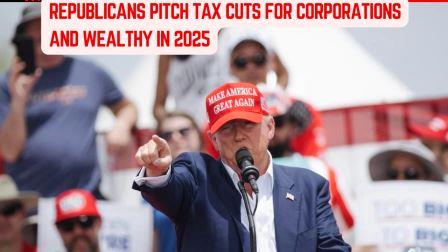The Republican Party is gearing up for a bold economic strategy, placing heavy emphasis on tax cuts for corporations and the wealthy in 2025. If Donald Trump secures the White House in the upcoming elections, the GOP has pledged to introduce sweeping changes, including extending key business tax breaks and scaling back regulations. This blog will delve into the Republican agenda, examining their proposed tax cuts for businesses and wealthy individuals and the potential impact on the U.S. economy.
At the heart of the GOP’s tax plans are extensions of provisions from the 2017 Tax Cuts and Jobs Act (TCJA), which significantly lowered the corporate tax rate. Republicans argue that these measures, along with reducing energy-sector regulations, will restore economic freedom and opportunity. However, Democrats strongly criticize these proposals as giveaways to wealthy individuals and corporations, warning of rising inequality.
Key Republican Proposals for 2025 Tax Cuts
One of the primary focuses of the GOP is the extension of tax cuts for corporations and the wealthy in 2025. The 2017 TCJA slashed the corporate tax rate from 35% to 21%, a move that Republicans say spurred business investments and job creation. However, these reductions are set to expire by the end of 2025, and the GOP aims to make them permanent. This would include restoring full deductions for business investments in equipment, machinery, and R&D, which Republicans claim will boost innovation and domestic production.
Speaker of the House Mike Johnson (R-La.) outlined the broader Republican economic plan, stating that within the first 100 days of a potential Trump administration, they would introduce a comprehensive agenda to extend these tax benefits. The tax cuts for corporations and the wealthy in 2025 would serve as the foundation of their economic approach, which promises to foster growth and opportunity. However, the opposing side argues that these benefits disproportionately favor the affluent, leaving behind middle- and lower-income Americans.
Regulatory Rollbacks on Energy and Corporate Tax Incentives
In addition to the tax cuts, the Republicans also plan to target energy production regulations, with a particular focus on the fossil fuel industry. Their aim is to reduce what they call burdensome environmental rules and regulations that they believe have stifled energy growth and raised consumer costs. The GOP also intends to eliminate certain fossil fuel tax preferences while restoring broader corporate incentives. The tax cuts for corporations and the wealthy in 2025 would complement these efforts by offering significant relief to companies, particularly those in energy and manufacturing.
Democratic Criticism and Economic Debate
Democrats have pushed back hard on the Republicans’ tax cuts for corporations and the wealthy in 2025, labeling them as unfair giveaways to the rich and large businesses. According to Democrats, the benefits from the 2017 tax law did little to help working-class Americans and led to greater income inequality. Furthermore, they argue that corporate tax cuts do not trickle down to benefit the wider economy in a meaningful way.
The debate over these tax cuts is likely to become a central issue in the 2024 elections, with each party working to sway voters by emphasizing their views on economic fairness. Republicans will aim to remind voters that their party brought about the initial 2017 tax reductions, which they say helped foster economic growth before the pandemic.
Conclusion
As the 2025 tax cut proposals emerge at the forefront of the Republican agenda, it’s clear that the outcome of the 2024 election will significantly shape the U.S. economic landscape. The tax cuts for corporations and the wealthy in 2025 could lead to long-term changes in the tax structure, favoring businesses and high-income earners while reducing government regulations. Yet, the debate remains heated, with Democrats prepared to challenge these plans every step of the way.
The stakes are high, and the nation will be watching closely as both parties gear up for what could be a pivotal moment in shaping America’s economic future.
See Also- United Auto Workers and Stellantis: Ongoing Negotiations Over U.S. Job Commitments
